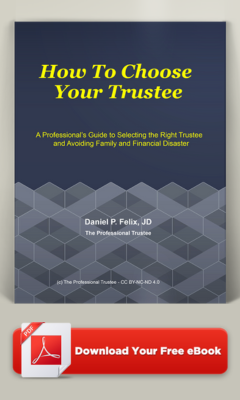What some savvy folk are doing to better face the inevitable
Many families are investing in preparation before their trusts become effective to minimize and avoid anticipated problems— problems which, if allowed to fester, can be costly in both dollars and family harmony.
This Article uses real-life examples to illustrate how professionals such as myself— known as Independent Trustees— work with families and their advisors to increase the likelihood of a smooth trust administration.
Specifically, here are four practices which are proven to not only save money and pain but are also reasonably calculated to bring a smoother transition and enhanced family harmony.
These four practices are:
- Preparing the family for administration a/k/a how money works after the grantor can no longer handle it.
- Advance coordination between trustee and the trust and estate attorney.
- Enabling professional guidance in the decision-making process.
- Conducting regularly scheduled advance meetings with the successor trustee.
These four practices are proven: my client families are deploying them with success.
Let me tell you some of the advance work that they’re doing:
1. Training family to serve. One couple is bringing in extended family to serve as overseers of the professionals, including the ability to replace those professionals. The couple has started preparing those extended family members in a process that includes:
- Sharing their goals and values.
- Confirming family members’ understanding of what the trust document says.
- Engaging in ongoing dialogue, because just talking about it can be helpful.
- Meetings with the professionals. And
- Addressing the logistics as well as the concerns of family members to ensure their involvement goes as smoothly and successfully as possible.
2. Advance coordination between trustee and the trust and estate attorney. That couple is also savvy enough to have invested in my working with their estate planning attorney before the documents were finalized. Among other things, I’ve helped expedite the finalization of the trust documents by suggestion some temporary solutions to a few of their thornier issues— problems that had stopped the preparation of the documents. As another success, in preparing a guide to the trust written in plain English, I also earned the attorney’s thanks by tactfully identifying a problem phrase in the trust document.
3. Enabling professional guidance in the decision-making process. Then there’s the business owner who had a deep love for his second wife, wanting to make sure she was taken care of before gifting to his beloved children, who are living independently. Once he got going in the preparedness process, he
- Structured governance to have both his widow and one of his children co-manage the trust. On my suggestion, he set them up for success by having all of us talking about their duties and responsibilities in advance.
- Embedded me in the process as a mediator and, if necessary, a tie-breaker. That role gave me the platform to consult with his trustees before a possible deadlock to make sure that these co-trustees started on the right foot— and stayed there!
4. Conducting regularly scheduled advance meetings with the successor trustee. There’s another couple who have put me in position to step in when the time comes as successor trustee of their living revocable trust. They have taken up my recommendation to invest now in quarterly meetings with me. Among other agenda items, we review tasks that they should take care of in advance, saving the expense and pain of the successor trustee starting on those tasks at a later time when the grantors are unable to participate. When one item— interviewing health care managers/advocates— remained on their list for several meetings, they were open to calling a couple of those essential health professionals right in the middle of one of our meetings. As a result, the couple has created an advance network of health and financial care that they want and are comfortable with.
Understand that I’m often brought in at time of need— sometimes extreme need— by families facing expensive and emotionally costly breakdowns in how their trusts are being administered.
Especially so, I’m deeply encouraged by individuals and couples who engage in advance work to avoid such crises. They know that things will go better for them and for their survivors— and will be less costly!— through this “pre-needs” work.
And it is work. Some of the work is clerical: gathering details from files and from various third parties.
Some of the work is making executive decisions such as, selecting key professionals for taking care of health, assets, and other family members as well as deciding on what supervision is appropriate and how succession will flow.
And perhaps the most difficult work: coming to grips with their mortality and legacy, and with their family, with who should get what and why— and whether and how their bequests will enhance the lives of those others. These are core issues for us as humans.
Our culture does not yet adequately support this work. Most of us are not trained in it. Worse, too many professionals in the field have a limited understanding of preparedness.
Perhaps these real-life examples will be an inspiration. In the meantime, these families are enjoying the peace of mind that comes with knowing they’ve done all they can to prepare for the inevitable. Can you say the same?
Image created by Envision Imact, Inc. Dan Felix photography by At a Glance Marketing
© 2018 – 2023 Daniel P. Felix, all rights reserved.


